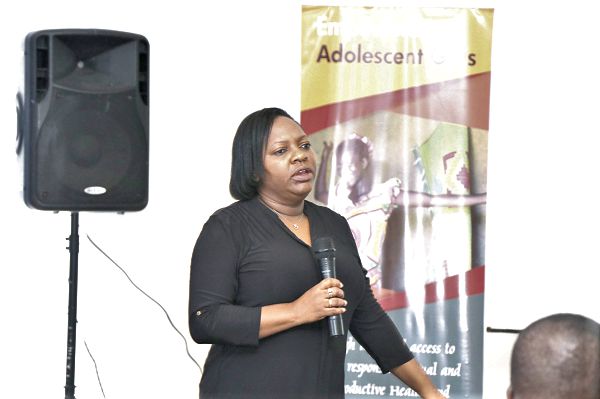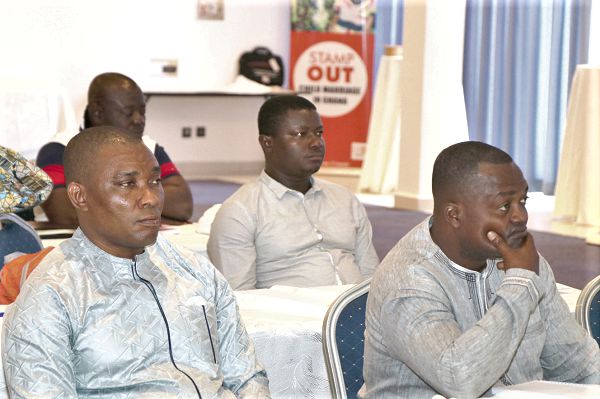
Parliamentarians commit to support population policies
The Parliamentary Caucus on Population has pledged to advocate for change in social norms, laws and policies and to uphold human rights that promote gender equality and empowerment of women and girls.
They stressed the importance of investing in adolescents’ health, especially gender-responsive sexual and reproductive health and rights (SRHR).
The Members of Parliament (MPs) encouraged the government to create investment opportunities for the youth as they were the main actors of population, reproductive health, gender equality, economic and social development and environmental protection.
These were contained in a ‘Declaration of Commitment’ made by the MPs after a two-day knowledge-sharing meeting on the International Conference on Population and Development (ICPD) held in Takoradi in the Western Region.

Joint programme
The meeting was organised as part of the UNFPA’s joint programme to empower adolescent girls through improved access to gender-responsive comprehensive sexuality education (CSE) and quality sexual and reproductive health (SRH) services in Ghana being implemented with support from the Canadian government.
The parliamentarians further committed to scale up advocacy on the implementation of comprehensive policies and programmes that promote socio-cultural, agricultural and economic development and environmental protection that can create enabling conditions for reproductive health and rights for all, including persons with disabilities.
Acknowledging that population constitutes a society and that without completing the unfinished business of the ICPD the SDGs will not be achieved, the parliamentarians committed to accelerating continued advocacy and policy making for the realisation of the ICPD.
They noted that the ICPD promise of universal access to SRH services was vital to deliver a world where preventable maternal deaths were fully prevented, where unmet need for family planning was zero, where gender-based violence and harmful practices were eliminated and where young people could live healthy and productive lives.
“In line with our role as parliamentarians, we commit to support the implementation of policies that link the national Constitution to the ICPD agenda,” they added.
Political commitment
The MPs also noted the remarkable progress achieved since the 1994 ICPD in Cairo and the Millennium Development Goals (MDGs), and called for stronger political commitment to actualise the full implementation of the ICPD Programme of Action.
They also pledged to keep the government accountable to the commitments made in Cairo and to achieving the SDGs by 2030.
Demographic dividend
In a presentation on the topic, “Harnessing the demographic dividend through CSE for young people”, Prof. Kofi Awusabo-Asare of the University of Cape Coast said with fewer people to support, a country had a window of opportunity for rapid economic growth if the right social and economic policies were developed and investments made.
Demographic dividend, he explained, referred to the accelerated economic growth that began with changes in the age structure of a country’s population as it transited from high to low birth and death rates.
Prof. Awusabo-Asare indicated that the pillars for achieving demographic dividend were employment and entrepreneurship, education and skills development, health and well-being, rights, governance and youth empowerment.
Young people, he said, constituted the potential human capital for socio-economic development and should be provided with the means to lead healthy and economically productive lives.
He emphasised that promoting sexual and reproductive health and rights for young people had benefits for the current state of young people, for their future and for their children.
Unfinished agenda
In his presentation, Prof. Stephen O. Kwankye of the University of Ghana said the ICPD in Cairo, 1994, which marked a big consensus among all 179 nations present, also marked a paradigm shift in the population and development discourse.
Speaking on the topic, “ICPD, Cairo and unfinished agenda”, Prof. Kwankye said the conference adopted a Programme of Action to guide implementation of future population-related programmes and activities in member states.
He said Ghana’s response to population-related issues anticipated many of the recommendations of ICPD, and although much progress had been made, a lot still needed to be done to respond to the unfinished agenda.
Prof. Kwankye cited for instance that the total fertility rate was stalling, modern family planning use was low, there was high unmet need, especially among adolescents and young people, maternal mortality ratio was high and there were still issues with child marriage, unwanted pregnancy among adolescents, induced abortion and access to SRH services for persons with disabilities.
“This calls for high-level government commitment in terms of funding, capacity building and collaborative partnership with the private sector, CSOs and development partners and sustained advocacy among all partners with the SDGs in focus,” he said.
Nairobi summit
The Deputy Country Representative of UNFPA, Ghana, Ms Erika Goldson, said the governments of Kenya and Denmark and the UNFPA were co-convening a Nairobi summit on ICPD25 in Nairobi to accelerate efforts to achieve the goals agreed on at the 1994 ICPD.
The summit, she stated, would mobilise political will and financial commitments needed to fully implement the ICPD Programme of Action and meet the SDGs by 2030.
It will further elicit voluntary commitments to end preventable maternal deaths, eliminate unmet need for modern contraceptives and end gender-based violence, child marriage and female genital mutilation, among others.
